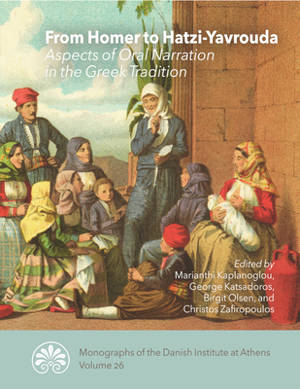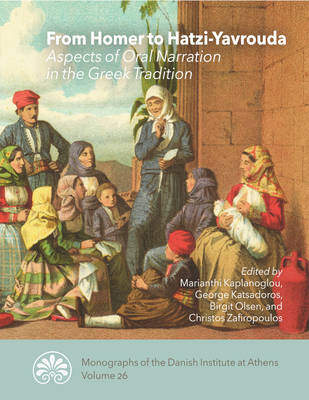
Bedankt voor het vertrouwen het afgelopen jaar! Om jou te bedanken bieden we GRATIS verzending (in België) aan op alles gedurende de hele maand januari.
- Afhalen na 1 uur in een winkel met voorraad
- In januari gratis thuislevering in België
- Ruim aanbod met 7 miljoen producten
Bedankt voor het vertrouwen het afgelopen jaar! Om jou te bedanken bieden we GRATIS verzending (in België) aan op alles gedurende de hele maand januari.
- Afhalen na 1 uur in een winkel met voorraad
- In januari gratis thuislevering in België
- Ruim aanbod met 7 miljoen producten
Zoeken
€ 72,95
+ 145 punten
Omschrijving
From Homer to Hatzi-Yavrouda - Aspects of Oral Narration in the Greek Tradition provides a multidisciplinary discussion of the concept of orality in the framework of Greek narrative tradition, from Antiquity to the 21st century. Orality is a prominent concept in contemporary folkloristics, philology, and other related fields and a basic concept for the study of culture in a historical and critical perspective. Its definition has long been debated, as has its communicative value and use. This volume presents different perspectives and academic fields (classics, byzantine studies, folklore studies, comparative literature) and discusses topics such as interrelationship with written literature, cross-cultural and trans-historical influences, different genres, as well as specific narrators and their role in their communities. Orality is viewed as a tool for research, a body of texts, an entity of vernacular practices, or as a series of communication strategies. The Greek tradition is taken as a point of departure for a diachronic analysis of orality, from Homer to the female storyteller, Hatzi-Yavrouda from Kos. It is the hope that the analysis of the Greek case will contribute to discussions about the concept on a larger scale. This volume also shows that orality, both in its old and new forms, is continuously present in modern and post-modern discourse and still dominates everyday communication, despite our growing dependence on digital and iconic universes.
Specificaties
Betrokkenen
- Auteur(s):
- Uitgeverij:
Inhoud
- Aantal bladzijden:
- 231
- Taal:
- Engels
- Reeks:
- Reeksnummer:
- nr. 26
Eigenschappen
- Productcode (EAN):
- 9788775972937
- Verschijningsdatum:
- 17/12/2024
- Uitvoering:
- Paperback
- Formaat:
- Trade paperback (VS)
- Afmetingen:
- 215 mm x 277 mm
- Gewicht:
- 984 g

Alleen bij Standaard Boekhandel
+ 145 punten op je klantenkaart van Standaard Boekhandel
Beoordelingen
We publiceren alleen reviews die voldoen aan de voorwaarden voor reviews. Bekijk onze voorwaarden voor reviews.









